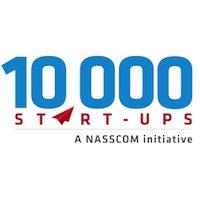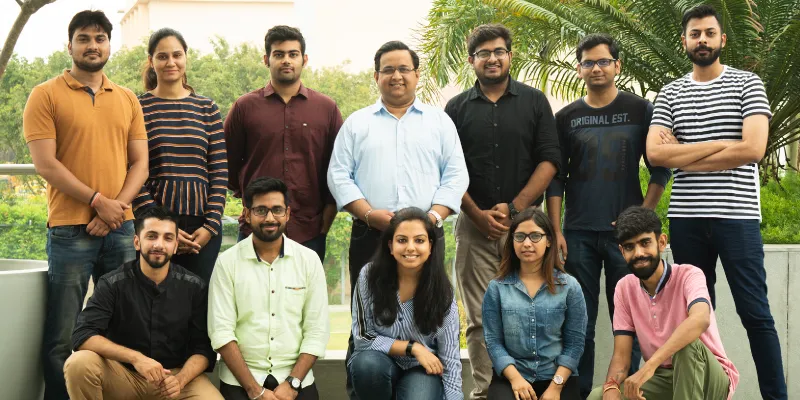
Nasscom 10 000 Start-ups
View Brand PublisherThis AI-based financial advisor can help you do your taxes, buy insurance and invest wisely, all through a single platform
The conundrum around money is that both managing with too much or too little can be a challenge. Say you get a windfall and come into some money; you struggle with financial decisions and are torn between making investments and repaying loans. If it’s the former, then what instrument do you choose?
“The financial services industry has been predominantly product-focused. Customers have had to build their own solutions across these products. Fintechs have the same approach – they are also product focused and expect customers to connect the dots across the platforms/products. This does not allow customers (who are not financially knowledgeable) to achieve their overall needs and keeps many people away from financial inclusion,” says Bharat Ravuri, founder and CEO of Hyderabad-based MintZip Solutions.

“Sound financial advisory is available but is limited to high net worth individuals. No one’s addressing the basic questions the majority are asking such as ‘How much insurance do I need?’, ‘How do I optimise tax?’ or ‘How do I reduce debt?’ Moreover, advisors are incentivised to sell high commission products, not what’s in the best interest of customers. There is no single platform that serves all the customer’s needs and customers must juggle and move money across different platforms. This takes time and effort, and customers feel like they’re losing control of their money.”
Customer-focused, friendly AI-based financial advisor
Founded in 2017, MintZip delivers end-to-end financial solutions by leveraging Artificial Intelligence and Big Data. “We are more focused on delivering end-to-end solutions to the customers than products. Our endeavour is to make their life simple by allowing them to focus on their career/life/passions while our product thinks through all their money needs and simplifies decisions that they have to make. Our core ethos is ‘Customocracy’ – The Rule of the Customer. We believe that every action/decision that we make in the company is focused on delivering true value to the customer,” says Bharat.
Their flagship product ‘Misa’ is an AI-based financial companion that gives a customer holistic, in-context, actionable financial insights, which help him / her make the right decision. Misa combines behavioural sciences, financial sciences and advanced technologies and is powered by Conversational AI. ‘She’, as Bharat refers to the solution, is continuously being trained on financial knowledge and will expertly guide the customer through the entire spectrum of financial products, not just wealth management. One can have a dialogue with Misa and ask her questions, and she will give a tailored response based on your specific financial situation. Further, Misa not only provides financial guidance, but also executes on the given advice – thus creating a single platform for the customers’ financial needs.
“Equipped with a voice and chat interface, Misa has the ability to execute smart solutions to help the customer spend optimally, increase savings, make timely payments, make intelligent investments, have the right insurance cover, get cost-effective borrowing opportunities and do seamless tax filings (including appropriate tax advisory to minimise tax),” says Bharat.
Misa is free for customers, and every time they make a transaction on the platform, MintZip earns money from financial institutions.
Faster and more inclusive financial advisory
A number of factors led to a product like Misa being built, says the founder. One of the primary reasons was the change in consumer behaviour over the years, thanks to social media. People, now used to more frequent and shorter conversations, no longer have patience for long-drawn-out advisories, and want instant results. In contrast, financial advisory services and their execution tend to focus on the distant future.
Then there’s the age factor. Today, wealth management is targeted at people over 40 who have significant money to invest, while those in a younger demographic requiring significant financial education, and with less money to invest, are overlooked. Also, with fintechs, customers need to juggle their money across different systems (wallets, bank accounts, loan companies, payments, robo-advisors etc.) and are starting to feel a loss of control.

“While financial services companies and fintechs help customers with their products, there is an expectation that the customers will find solutions to their financial health on their own. However, lack of knowledge about the products and, more importantly, lack of time for people to deeply focus on these aspects is causing many people to make the wrong decisions about their financial life,” says Bharat.
According to him, they stand apart from competition with Misa since it is a first-of-its-kind conversational AI-driven financial companion, which also acts like an end-to-end platform for all financial solutions.
Role of NASSCOM 10,000 Startups
MintZip was incubated at the Noida Warehouse of NASSCOM 10,000 Startups. Bharat says, “NASSCOM 10,000 Startups has done a phenomenal job in growing the startup ecosystem in the country. In addition to the incubation space, they provide to you in the warehouse (which is an excellent real estate space at extremely cost-effective rates), they provide tremendous networking opportunities with corporates (through their corporate connect programmes) and investors (through their demo day and investor meet programmes). The NASSCOM 10,000 Startups team have gone out of their way to help me personally and our company whenever we faced any challenge. They are always there to provide guidance, connect with people in the industry or just be a sounding board to bounce off ideas.”
Challenges and road ahead
While we are seeing an increased number of digital transactions year-on-year, India is still a cash-driven economy, which poses a challenge to the fintech space. According to Bharat, while demonetisation pushed people to adopt digital media due to cash crunch, now that cash is available, there has been a relative decline in digital transactions. He believes that true growth for fintechs will occur only when they are able to convince people to move people away from cash transactions.
This is not an easy task, he admits. With heightened awareness on data security and data privacy, people are more hesitant about data that they share. And since fintechs have access to sensitive financial information, people are wary about them too.
Then there’s the ever-changing regulatory landscape, which fintechs need to keep pace with. “Regulators are revisiting regulations in the context of digital streams. Since most of these regulations tend to come after fintech companies are operational and already servicing customers, they must change their business model and mechanisms to get their businesses to comply with new regulations. This is challenging for fintechs as they must re-align and comply with these regulations without hampering service to customers,” says Bharat. Nevertheless, he adds, that a significant amount of work is being done by fintechs in collaboration with the government and financial institutions to ensure a smoother passage into the future for everyone.
The 18-member MintZip team has a cumulative work experience of 100+ years in the financial services and technology sectors. Bharat has over 25 years’ experience in financial services in companies like Citibank, Fidelity Investments and in US, UK, Japan and India - across business, technology and operations.
Bootstrapped at present, MintZip is in conversations with investors to raise funding. They recently launched a version of their product for corporates to offer their employees. “Employer priorities are shifting. A recent PWC report indicates that one in three employees are distracted at the workplace due to personal finances. As per the report, around 50 percent of employees spend over three hours every week, at work, worrying about money. We are increasingly seeing a trend of employers starting to focus on the financial wellness of their employees,” says Bharat.
According to him, the fintech journey is still at the beginning of a runway. “People are still anxious about money and their future. There are obstacles to overcome, but if fintechs manoeuvre through these challenges, the take-off would be brilliant,” he concludes.







